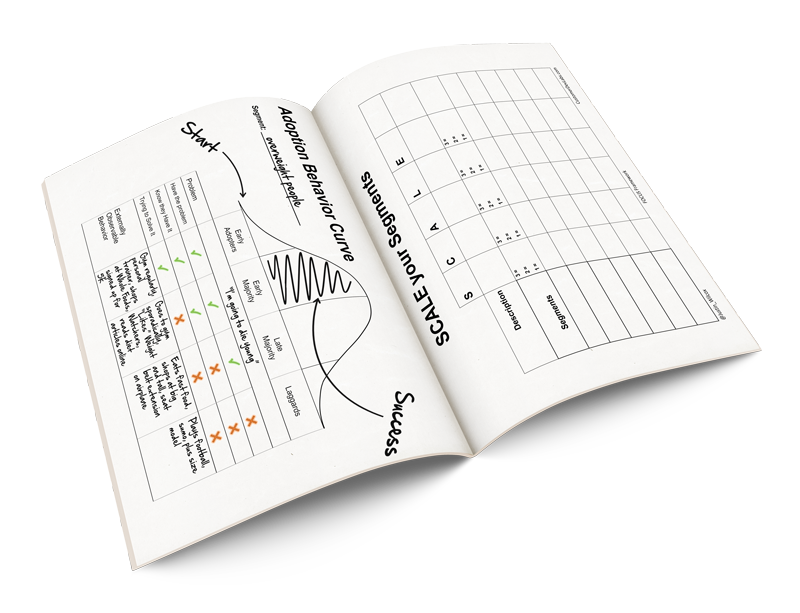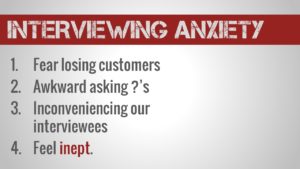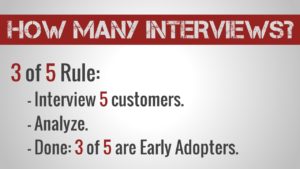I recently started 1-on-1 mentoring sessions where one of the most popular questions has been:
Approaching a busy professional and asking for their time, so I could eventually sell them something, was a mystery to me when I started customer development. After some trial and error though, I found a workflow that converts pretty well.
We know Mechanical Turk can help with B2C customer interviews, but this post is all about B2B and the secrets of sending cold emails.
Step 1: Get their Email Address
There are quite a few ways to get cold contacts’ email addresses, all of which I can recommend:
- Rapportive Hack
- JigSaw (now Connect at Data.com)
- Mechanical Turk
And now there’s a new tool in town that I’m really excited about: Kimono.
Kimono is a free web scraper that doesn’t require writing code. If you find a web page with the contact information of customers you’d like to interview, Kimono can collect it for you automatically. Here’s a quick video of how it works:
Step 2: Write the Email
There are 3 things a cold email must be in order to generate a response:
- Short
- Personal
- Valuable
Let’s take an example:
Subject: Remote coding
Hi Sam,
I read your article on volunteering your professional skills in Guatemala – it was really inspiring. I’m looking to travel more and you’ve got me thinking about incorporating volunteering when I do!
I have a software company trying to improve remote medical record coding.
I’m not looking to sell anything, but since you have so much expertise with remote coding, I’d love to get your advice on our product so we don’t build the wrong thing.
If you’re available, I’d love to chat for just 20 minutes – Thur or Fri morning?
Thanks for any help,
Justin
Let’s see how we did:
Short? 5 sentences. That’s all you need. Any longer than that and you’re wasting their time.
Personal? This part is the most work, but it’s what’s going to separate you from the spammers. Plus, researching each of your customers to find something unique about them is going to give you incredible insight. Consider commenting on their:
- Blog posts
- Any professional organizations they belong to
- Companies listed on their LinkedIn profile
- Tweets they’ve sent
This is Important: Don’t skip this part. Without something personal in there you’re liable to get flagged as spam. If that happens enough times, you’ll forever be relegated to junk mail.
Valuable? In this case we’re offering to “improve remote medical record coding.” Our hypothesis is that Sam has problems with her remote coding process and by hinting that we’re trying to solve them, we’re giving her a reason why spending 20 minutes with us will be worth her time.
Without this line you’re “offering” to take 20 minutes of her time, and giving nothing back. Why would she sign up for that?
Note: Be vague. You don’t want to seed your customer with the problem you’re hypothesizing. Note how the email doesn’t say anything about making “remote coding”:
- Faster
- Cheaper
- More secure
- More accurate
When we interview Sam, we want her to tell us what problems she has with remote coding – no cheating.
Bonus Secret: Ask for Advice. The line, “I’m not looking to sell anything. I’m just looking for your advice so we don’t build the wrong thing.” is not only true (you’re not selling anything), it lowers your customer’s defenses and appeals to their inner-adviser.
Step 3: Send the Email
You can send the emails one at a time, but it’s boring and monotonous to copy & paste the same email over and over again. Plus, its annoying to keep track of who has replied and who hasn’t – especially when there’s a kick ass tool like Streak.
Streak is a CRM embedded in GMail, and it’s great for a number of reasons:
- Mail Merge – Automate sending mass, but personalized, emails.
- Easy Follow-ups – Track which customers have replied and which have haven’t. Send follow-ups to those who haven’t.
- Scheduled Email Delivery – Write emails at 2 am, but send them at 2 pm.

Here’s a video outlining exactly how to use Streak to request, and keep track of, customer discovery interviews:
Conclusion
With tools like Kimono, Streak and the 3 secrets to a great cold-email, I’ve setup interviews with a 50% success rate from complete strangers – you have everything you need to do the same!
If you follow these steps and no one replies, it could be back luck or…you could be solving a problem no one has.
What’s Next?
This is Part 3 of our series of on Interviewing Customers. Check these bad boys out:
- Which Customers Should you Interview (The SPA Treatment)
- How to Find Customers to Interview
- Getting Customer Interviews with Cold Emails
- How I Interview Customers
- You’ve Interviewed Customers. Now what?
Our next post will be…Please don’t build an MVP. Subscribe to get it via Email or RSS.
First time to Customer Development Labs?
Check out our other popular experiments:
- MTurk + Google News = Press
- Interviewing 100 customers in 4 hours with MTurk
- Testing your Domain Name






Hi Justin,
This is really useful, thanks!
Any advice for reaching out to people who aren’t active online and don’t really have a presence online so they don’t have social media profiles or post articles/blogs? This is the part I’m finding the hardest… I guess the only thing that they have in common is that they work in the same sector (very variable roles within that sector though…so all the way from General Managers to Coordination Officers)…
Hi Sharon, it’s a good question – thanks for asking!
If you can’t personalize something, I think your best bet is to try to:
– Ask a lot of people
– Don’t get discouraged when they don’t agree to talk to you
– Work as hard as you can to keep refining your problem hypothesis until people agree to talk to you about their problems.
Be ware though that people in different roles may have different problems. If that’s true, group people by their common problems and treat each of those groups as customer segments.
Best of luck Sharon and keep up the good work of helping others!
Thanks that’s super helpful, really appreciate it
Hi Justin,
I was wondering if it is a good idea to do follow up emails after the first one? in case they did not answer.
Absolutely, one or even two follow-up emails make sense to me.
Do you use your personal email/gmail account for emailing interview requests? Do you have any metrics on how many interviews one should conduct ?
Hi Jeeth, anything you can do to help your interviewees feel like the time they give you will be well spent can be helpful in acquiring your interviews. To that end, a non-gmail email address will probably help quite a bit, as will even a basic landing page associated with that domain. It doesn’t need to detail what the company does, just that it exists and its working on a new product to help the type of people you’re targeting.
As for how many to conduct, I recommend interviewing 5 customers at a time, and continue interviewing until at least 3 out of 5 of them are taking actions to solve the same problem. That could be anywhere from 10 to 100+ interviews based on how well you target your interviews.
For a many more practical tips on getting your interviews, and conducting them more efficiently, consider checking out FOCUS: https://thefocusframework.com. It’ll walk you through the interviewing process step-by-step.
Justin
Re email address, you might try both your personal email address and a branded one. Depending on your customer segment you may see different response rates (e.g. perhaps B2B customers will respond more quickly to a branded email address like yourcompany.com than they will a gmail address).
As far as number of customers to interview, check out my new blog post that answers that specific question: https://customerdevlabs.com/2017/04/10/how-many-customers-should-you-interview/
Thank for sharing. Beside Kimono, Octoparse is also very help in extracting data.
This software can simulate human operation, interacts with the web page, click “+More” and extract data. It provides operations such as click, hover, pull-down switching, as well as the combination like cycling and branch judgment. Almost no need to write any code. And you can extract the data you need. You can visit the website to get more information about.
Is it better to send a linked in inmail or a cold email to a prospects work email?
Hey Justin,
Great article. just to share a small chrome extension I discovered, http://webscraper.io/. It is free and open source.
It is very quick to setup (with a bit of tech knowledge) and very powerful for scrapping listings.
Justin,
I’m having a hard time getting out of the gate and finding people to interview.
Below is the text of a posting I made on my Facebook and LinkedIn pages, which garnered only one response. Would you please share your feedback (criticism is welcome – it’s how I get better). Thank you.
>> WANTED: Looking to talk in person or via phone with people who have bought or sold (or might soon buy or sell) an apartment or house in NYC valued between $500k and $1.5 million.
I promise that I’m not a real estate broker and I’M NOT TRYING TO SELL ANYTHING.
I’m looking into building a new startup company, trying to improve and simplify real estate buying and selling in NYC.
I’m looking to talk with people who have been or might be in that world so I can learn what works well about the current system and what they’d like to see get better (faster, simpler, cheaper, etc).
If someone meets the criteria above and wants to talk anonymously, that’s fine. They can call me at *67 [redacted] (the *67 keeps their number and name private – no caller ID).
Please pass this on to anyone who fits the criteria and might share 5 or 10 minutes of their time.
Thank you for your help!
-Mark Gavagan
Hey Mark, good on you for trying to talk to your customers. This part can be tricky, but I think you can get it. Consider…
This is an unpersonalized social media post, not a personalized cold email. It’s closer to standing on a street corner shouting, “Please come talk to me!” than it is approaching someone who just put up the for sale sign on their house, commenting on how beautiful their garden looks, and asking what’s the hardest part about selling their home.
Things to tweak:
Give those tweaks a shot and you’ll be a lot closer to having the conversations you want.
All the best,
Justin
Hey Justin great article, lots of good practical tips. I’m the founder of QuickMail.io, many of our customers used the tools yu mentioned before coming to us. Fancy a personal demo? Not selling you anything, just making sure we don’t build the wrong stuff :)
I’d love one!
At the moment, I’m completely focused on providing a kick ass experience for Customer Acquisition Teams, but if you’d be up for recording a quick video I’d be happy to take a look and we can try to schedule a conversation in a couple weeks.
Cheers,
Justin
Awesome Justin, let me come back to you on that one then. I got an idea for the type of video you would enjoy :)
There you go, I did that quickly this morning. Here is how it looks like with QuickMail.io http://youtu.be/4G8jgZNKdhs
Let me know what you think!
Thanks Jeremy, looks great!
I’m going to pass it along to a couple teams in our Customer Acquisition Team (http://bit.ly/CATeams) Facebook group. Looks handy for folks who are looking to execute a known sales channel.
How does QuickMail help users avoid getting flagged as SPAM? When ever I get a reminder to an email I didn’t reply to, that doesn’t include an unsubscribe link, I hit the flag as SPAM button.
Justin
Oh great, let them know to tell me they come from you and I’ll take extra care of them.
My initial reaction to your question would be: write better copy! :) How can you give the impression of personal email if you have a link at the bottom to ask them to unsubscribe.
In my follow ups, I have a {{reminder}} keyword that I use to make it personal.
That said, I like the idea, thanks for suggesting it. I’ll add a {unsubscribe} URL you could stick in your template if you want to then.
I was facing the very same issue, and there was very low success rate. Thanks for the share, its quite helpful.
This is awesome!
Great post Justin! I applied your techniques and got responses back from the people I reached out to. Thanks!